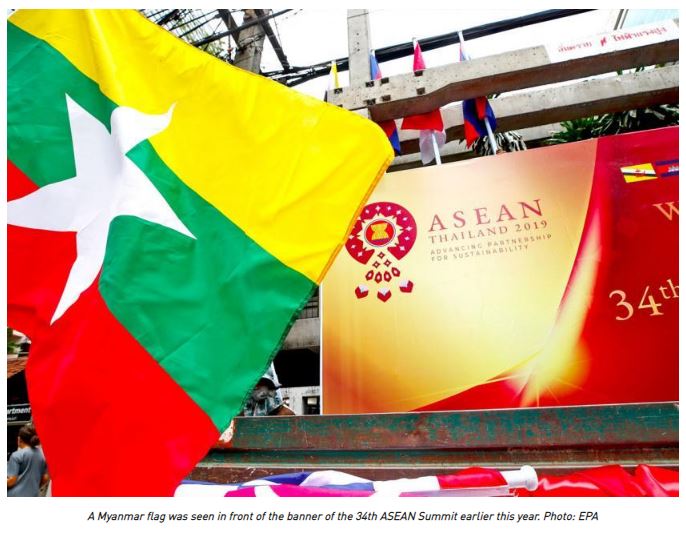Trade war could be ‘silver lining’ for Myanmar
Myanmar has to move to tap into opportunities created by trade tensions between the world’s two largest economies, said a senior Singaporean academic.
The US-China trade war has provided “silver linings” for many countries, such as Vietnam. in the Southeast Asia region, said Simon Tay, Chairman of Singapore Institute of International Affairs (SIIA), in the opening speech at the Myanmar-Singapore Business Summit yesterday.
Vietnam saw a record high of foreign investment last year, owing partly to manufacturers relocating away from China to avoid the trade tariffs.
The question for Myanmar is whether the country can materialise these “silver linings”, Prof Tay added.
“We expect Singapore investors to enter into real estate, infrastructure and financial sectors of Myanmar in coming years,” U Thant Zin Lwin, head of the Directorate of Investment and Company Administration (DICA) and secretary of the Myanmar Investment Commission (MIC) told The Myanmar Times at a sideline interview.
The official added he expects further investments in the real estate market and in industry and that the city-state will support Myanmar in taking steps towards intellectual property rights reform.
Organised by the Singapore Association of Myanmar and the Singapore Institute of International Affairs with support from the Singapore Embassy, the summit was themed “Singapore: Myanmar’s Gateway to the World”.
Speaking at a panel, Yasuo Tanabe, chief executive officer of Global Link Lab Inc., said the Myanmar government needs to continue to improve the transparency and efficiency of the regulatory environment.
The country also needs to expand its energy and transport infrastructure, scaling up the reliability and supply of electricity, in order to attract more inward investments.
Many businesspeople see the lack of reliable power supply as the primary challenge to attract manufacturers. Myanmar is now trying to rush ahead five emergency power projects aiming to add 1000 megawatts by next summer, in order to avoid repeating this summer’s blackouts and scheduled outages.
During the Q&A session of a panel discussion, U Aung Ko Ko, a member of the ruling party’s economic committee, commented that the country wants to push through gradual reform and not rapid changes, emphasising efforts to create a “level-playing field” for businesses.
The economist also raised the prospects of e-government and the digital economy.
“We have to catch up with their [other member states in ASEAN] economies,” U Aung Ko Ko added.
Acknowledging the ongoing reform in Myanmar, Daw Win Win Tint, group chief executive officer of City Holdings Limited, said: “We need to ask ourselves whether we are really progressing anywhere and whether the reform is fast enough for the country’s development?”
According to the statistics from DICA up to the end of October, Singapore is the biggest source of foreign direct investment (FDI) in Myanmar with US$22 billion, accounting for more than 27 percent of total FDI. China comes second with over US$20 billion.
Some European and Chinese companies invest in Myanmar through their Singapore subsidiaries. For example, Chinese state-owned PetroChina International used its Singapore unit Singapore Petroleum to set up a filling station in Yangon with Shwe Taung Group.
“Singaporean companies are interested in many sectors like education, healthcare and energy distribution,” said Singapore ambassador Vanessa Chan, noting the “huge potential” of the Myanmar economy and the regulatory and legal reforms made.
The ambassador stressed the importance of pushing ahead the project bank and land bank that could speed up and operationalise investments in Myanmar.
Source: https://www.mmtimes.com/news/trade-war-could-be-silver-lining-myanmar.html


 English
English




